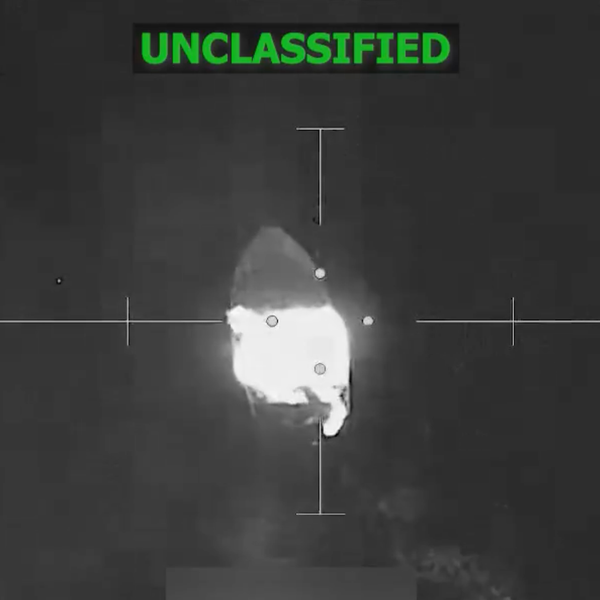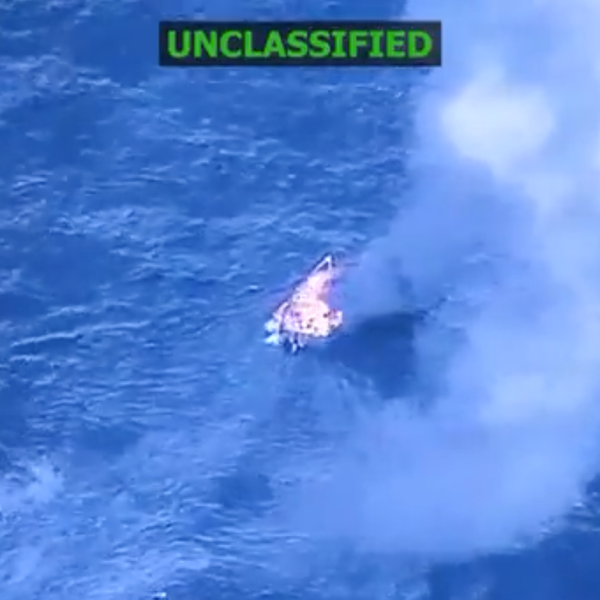Not One More Whale Killed: Capt. Paul Watson, Defender of Whales, at Sea Again
Sea Shepherd founder thwarts Interpol in 9,000-mile journey to Southern Ocean
Paul Watson, Interpol fugitive and founder of the marine wildlife-defending group Sea Shepherd, is back at sea on a mission to save the whales.
Despite "red notices" issued by Interpol for the oceans crusader, Watson made a journey of 9,000 miles "across two oceans and countless rivers, over three mountain ranges, across a desert, over lakes, and through dozens of cities and towns" to stop Japan's killing of whales in the Southern Ocean, he explains in a commentary posted on the Sea Shepherd site.
Watson has been fleeing Interpol for months. The Guardian explains:
In July, Watson fled from Germany after being arrested at the behest of the Costa Rican government, which is pursuing him on a warrant that claims he endangered a fishing vessel crew in 2002.
Watson contends the Costa Rican charges were filed because of pressure from the Japanese government and that he eventually would have been extradited to Japan if he had remained in custody.
Shortly after his arrest in May, Sea Shepherd issued a statement saying Watson was filming a documentary at the time of the alleged incident, which took place in Guatemalan waters in 2002.
The US-based group said it encountered an illegal shark finning operation run by a Costa Rican ship, the Varadero, and told the crew to stop and head to port to be prosecuted. The crew accused Watson's team of trying to kill them by ramming their ship.
Now aboard the group's flagship, Steve Irwin, Watson is ready to embark on Operation Zero Tolerance, the organization's ninth and biggest campaign to defend Antarctic whales.
Watson writes that Japan plans to "murder 1,035 whales in the Southern Ocean Whale Sanctuary" from its whaling ship Nisshin Maru. Australia's The Age adds:
Japan's Institute of Cetacean Research does not comment on the movements of its whaling fleet. It conducts its lethal program under International Whaling Commission rules with a self-awarded scientific research permit.
The Fisheries Agency of Japan, which controls the institute, said before a partial refit of the Nisshin Maru began in September there was "no possibility" Japan would miss the Antarctic season this year.
The mission of Sea Shephard's campaign "is twofold," he says, "to save the lives of whales and to cost the Japanese whaling industry as much as we possibly can in financial losses."
For Watson, saving the whales is ultimately about saving ourselves. He writes of Sea Shepherd's actions:
We do what we do so the whales may live. We do what we do for the children of the future, so that they may live in a world with whales, for when the whales are no more, the sea will die and when the sea is no more - we, all of us, will die!
* * *
Watson gave this video address from aboard the Steve Irwin:
An Urgent Message From Our Co-Founder
Dear Common Dreams reader, The U.S. is on a fast track to authoritarianism like nothing I've ever seen. Meanwhile, corporate news outlets are utterly capitulating to Trump, twisting their coverage to avoid drawing his ire while lining up to stuff cash in his pockets. That's why I believe that Common Dreams is doing the best and most consequential reporting that we've ever done. Our small but mighty team is a progressive reporting powerhouse, covering the news every day that the corporate media never will. Our mission has always been simple: To inform. To inspire. And to ignite change for the common good. Now here's the key piece that I want all our readers to understand: None of this would be possible without your financial support. That's not just some fundraising cliche. It's the absolute and literal truth. We don't accept corporate advertising and never will. We don't have a paywall because we don't think people should be blocked from critical news based on their ability to pay. Everything we do is funded by the donations of readers like you. Will you donate now to help power the nonprofit, independent reporting of Common Dreams? Thank you for being a vital member of our community. Together, we can keep independent journalism alive when it’s needed most. - Craig Brown, Co-founder |
Paul Watson, Interpol fugitive and founder of the marine wildlife-defending group Sea Shepherd, is back at sea on a mission to save the whales.
Despite "red notices" issued by Interpol for the oceans crusader, Watson made a journey of 9,000 miles "across two oceans and countless rivers, over three mountain ranges, across a desert, over lakes, and through dozens of cities and towns" to stop Japan's killing of whales in the Southern Ocean, he explains in a commentary posted on the Sea Shepherd site.
Watson has been fleeing Interpol for months. The Guardian explains:
In July, Watson fled from Germany after being arrested at the behest of the Costa Rican government, which is pursuing him on a warrant that claims he endangered a fishing vessel crew in 2002.
Watson contends the Costa Rican charges were filed because of pressure from the Japanese government and that he eventually would have been extradited to Japan if he had remained in custody.
Shortly after his arrest in May, Sea Shepherd issued a statement saying Watson was filming a documentary at the time of the alleged incident, which took place in Guatemalan waters in 2002.
The US-based group said it encountered an illegal shark finning operation run by a Costa Rican ship, the Varadero, and told the crew to stop and head to port to be prosecuted. The crew accused Watson's team of trying to kill them by ramming their ship.
Now aboard the group's flagship, Steve Irwin, Watson is ready to embark on Operation Zero Tolerance, the organization's ninth and biggest campaign to defend Antarctic whales.
Watson writes that Japan plans to "murder 1,035 whales in the Southern Ocean Whale Sanctuary" from its whaling ship Nisshin Maru. Australia's The Age adds:
Japan's Institute of Cetacean Research does not comment on the movements of its whaling fleet. It conducts its lethal program under International Whaling Commission rules with a self-awarded scientific research permit.
The Fisheries Agency of Japan, which controls the institute, said before a partial refit of the Nisshin Maru began in September there was "no possibility" Japan would miss the Antarctic season this year.
The mission of Sea Shephard's campaign "is twofold," he says, "to save the lives of whales and to cost the Japanese whaling industry as much as we possibly can in financial losses."
For Watson, saving the whales is ultimately about saving ourselves. He writes of Sea Shepherd's actions:
We do what we do so the whales may live. We do what we do for the children of the future, so that they may live in a world with whales, for when the whales are no more, the sea will die and when the sea is no more - we, all of us, will die!
* * *
Watson gave this video address from aboard the Steve Irwin:
Paul Watson, Interpol fugitive and founder of the marine wildlife-defending group Sea Shepherd, is back at sea on a mission to save the whales.
Despite "red notices" issued by Interpol for the oceans crusader, Watson made a journey of 9,000 miles "across two oceans and countless rivers, over three mountain ranges, across a desert, over lakes, and through dozens of cities and towns" to stop Japan's killing of whales in the Southern Ocean, he explains in a commentary posted on the Sea Shepherd site.
Watson has been fleeing Interpol for months. The Guardian explains:
In July, Watson fled from Germany after being arrested at the behest of the Costa Rican government, which is pursuing him on a warrant that claims he endangered a fishing vessel crew in 2002.
Watson contends the Costa Rican charges were filed because of pressure from the Japanese government and that he eventually would have been extradited to Japan if he had remained in custody.
Shortly after his arrest in May, Sea Shepherd issued a statement saying Watson was filming a documentary at the time of the alleged incident, which took place in Guatemalan waters in 2002.
The US-based group said it encountered an illegal shark finning operation run by a Costa Rican ship, the Varadero, and told the crew to stop and head to port to be prosecuted. The crew accused Watson's team of trying to kill them by ramming their ship.
Now aboard the group's flagship, Steve Irwin, Watson is ready to embark on Operation Zero Tolerance, the organization's ninth and biggest campaign to defend Antarctic whales.
Watson writes that Japan plans to "murder 1,035 whales in the Southern Ocean Whale Sanctuary" from its whaling ship Nisshin Maru. Australia's The Age adds:
Japan's Institute of Cetacean Research does not comment on the movements of its whaling fleet. It conducts its lethal program under International Whaling Commission rules with a self-awarded scientific research permit.
The Fisheries Agency of Japan, which controls the institute, said before a partial refit of the Nisshin Maru began in September there was "no possibility" Japan would miss the Antarctic season this year.
The mission of Sea Shephard's campaign "is twofold," he says, "to save the lives of whales and to cost the Japanese whaling industry as much as we possibly can in financial losses."
For Watson, saving the whales is ultimately about saving ourselves. He writes of Sea Shepherd's actions:
We do what we do so the whales may live. We do what we do for the children of the future, so that they may live in a world with whales, for when the whales are no more, the sea will die and when the sea is no more - we, all of us, will die!
* * *
Watson gave this video address from aboard the Steve Irwin:

